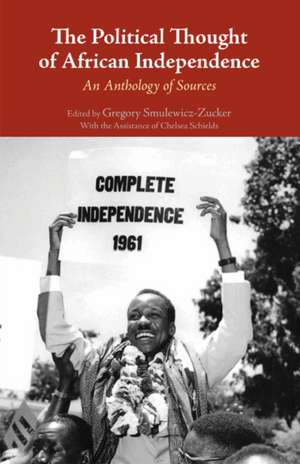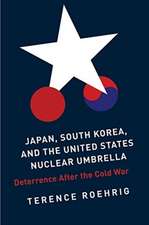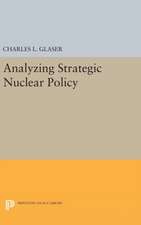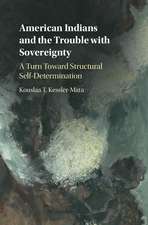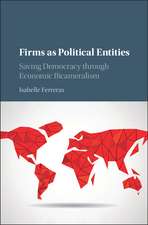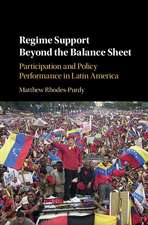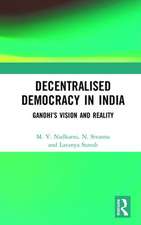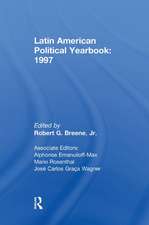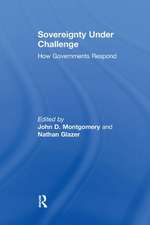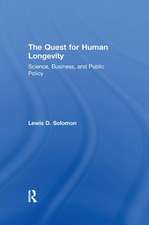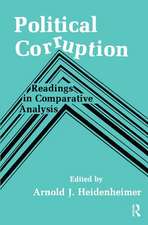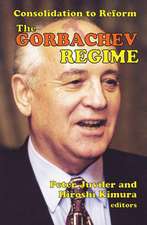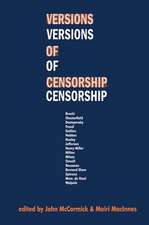The Political Thought of African Independence: An Anthology of Sources
Editat de Gregory R. Smulewicz-Zucker Chelsea Schieldsen Limba Engleză Hardback – 31 aug 2017
| Toate formatele și edițiile | Preț | Express |
|---|---|---|
| Paperback (1) | 237.60 lei 3-5 săpt. | |
| Hackett Publishing Company,Inc – 31 aug 2017 | 237.60 lei 3-5 săpt. | |
| Hardback (1) | 544.83 lei 3-5 săpt. | |
| Hackett Publishing Company,Inc – 31 aug 2017 | 544.83 lei 3-5 săpt. |
Preț: 544.83 lei
Preț vechi: 696.63 lei
-22% Nou
Puncte Express: 817
Preț estimativ în valută:
104.26€ • 108.24$ • 86.94£
104.26€ • 108.24$ • 86.94£
Carte disponibilă
Livrare economică 03-17 martie
Preluare comenzi: 021 569.72.76
Specificații
ISBN-13: 9781624665417
ISBN-10: 1624665411
Pagini: 298
Dimensiuni: 140 x 215 x 22 mm
Greutate: 0.47 kg
Editura: Hackett Publishing Company,Inc
Colecția Hackett Publishing Company, Inc (US)
ISBN-10: 1624665411
Pagini: 298
Dimensiuni: 140 x 215 x 22 mm
Greutate: 0.47 kg
Editura: Hackett Publishing Company,Inc
Colecția Hackett Publishing Company, Inc (US)
Recenzii
A great accomplishment. Not only does Smulewicz-Zuckers anthology bring together a diverse array of sources (54 in total), it also weaves together what are more or less canonical sources in twentieth-century African political thought with many unexpected, yet equally rich and illuminating, items. Smulewicz-Zucker has chosen material from all of the continents major regions, including . . . documents from more than two-dozen different countries, international and regional organizations, and conferences. Moreover, he has organized the material in a way that creates an engaging and powerful narrative articulating the complicated history of African independence. This outstanding collection will surely find its way into undergraduate courses in fields as diverse as African history, international relations, comparative politics, and even political theory. -- Jeffrey Ahlman, Smith College
Cuprins
Contents: Introduction Part One: Early Visions of Independence Introduction 1. Samuel Crowther -- Letter to the Secretaries of the Church Missionary Society, 1841 2. James Africanus Horton -- Advice to the Rising Generation in West Africa, 1868 3. The Fante Confederation Constitution, 1871 4. Edward Blyden -- The Origin and Purpose of Colonization, 1881 5. W.E.B. Du Bois -- To the Nations of the World, 1900 6. Mojola Agbebi -- The West African Problem, 1911 7. J.E. Casely Hayford -- Race Emancipation -- Particular Considerations: African Nationality, 1911 8. Marcus Garvey -- If You Believe the Negro Has a Soul, 1921 Part Two: Paths to Independence Introduction 9. The Fifth Pan-African Congress -- Resolutions, 1945 10. Jomo Kenyatta -- Speech at the Kenya African Union, 1952 11. George Padmore -- Communism and Black Nationalism, 1956 12. Flix Houphouet-Boigny -- French Africa and the French Union, 1957 13. Charles de Gaulle -- The Franco-African Community, 1958 14. The All-African People's Conference -- Resolution on Imperialism and Colonialism, 1958 15. Bibi Titi Mohammed -- "Travel for TANU": Interview, 1958 16. Sekou Tour - The Political Leader Considered as the Representative of a Culture, 1959 17. Gamal Abdel Nasser -- The Philosophy of the Revolution, 1959 18. Harold Macmillan -- Wind of Change, 1960 19. Henrik Verwoerd -- Response to Macmillan 20. Patrice Lumumba -- Two Speeches, 1960 21. The United Nations -- Declaration on Granting Independence to Colonial Countries and Peoples, 1960 22. K.A. Busia -- The Challenge of Nationalism, 1962 Part Three: Independence Struggles Introduction 23. Karari Njama -- Reflections on the Mau Mau Oath, 1952 24. Albert Luthuli -- The Road to Freedom is Via the Cross, 1952 25. The Algerian National Liberation Front -- Proclamation of the FLN, 1954 26. The Federation of South African Women -- The Women's Charter, 1954 27. The South African Congress of the People -- The Freedom Charter, 1955 28. The People's Movement for the Liberation of Angola, 1956 29. Ndabaningi Sithole -- White Supremacy and African Nationalism, 1959 30. Nelson Mandela -- I am Prepared to Die, 1964 31. Ian Smith -- Announcement of Unilateral Declaration of Independence, 1965 32. Harold Wilson -- Position of the British Government on the Unilateral Declaration of Independence by Rhodesia, 1965 33. Amilcar Cabral -- The Weapon of Theory, 1966 34. Andimba Toivo ya Toivo - Freedom for Namibia, 1968 35. Emeka Ojukwu -- The Ahiara Declaration, 1969 36. Eduardo Mondlane -- The Struggle for Independence in Mozambique, 1969 Part Four: Legitimating Independence Introduction 37. Kwame Nkrumah -- I Speak of Freedom, 1961 38. Tom Mboya -- Tensions in African Development, 1961 39. Kabaka Mutesa II -- Decision to Co-operate with Uganda, 1961 40. Sir Ahmadu Bello -- Regional Government, 1962 41. Julius Nyerere -- Ujamaa: The Basis of African Socialism, 1962 42. Organization of African Unity -- Founding Charter, 1963 43. Haile Selassie I -- A Call to African Leaders, 1963 44. Sir Abubakar Tafawa Balewa -- Addis Ababa, 1963 45. Nnamdi Azikiwe -- Tribalism: A Pragmatic Instrument for National Unity, 1964 46. Jomo Kenyatta -- A One Party System, 1964 47. Lopold Sdar Senghor -- African Socialist Humanism, 1964 48. Kwame Nkrumah -- Consciencism, 1964 49. Kanyama Chiume and Ex-Malawian Ministers -- Appeal to the U.N. and O.A.U. 50. J.B. Danquah -- Letter from Prison to Kwame Nkrumah, 1964 51. Vera Chirwa -- Origins of the Cabinet Crisis, 1964 52. Obafemi Awolowo -- Thoughts on Nigerian Constitution, 1966 53. Kenneth Kaunda -- African Development and Foreign Aid, 1966 54. The Tanganyika African National Union -- The Arusha Declaration: On the Policy of Self-Reliance in Tanzania, 1967
